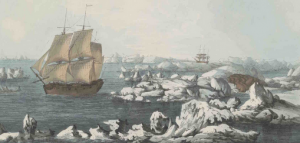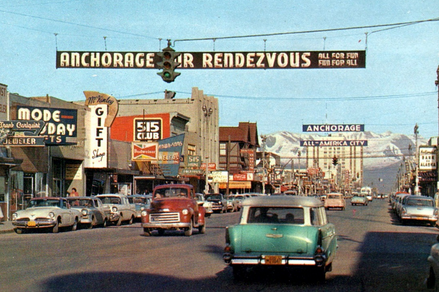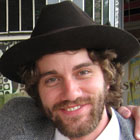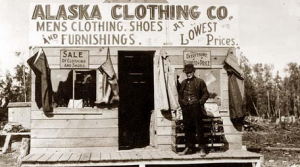UAA historians play role in Anchorage's Centennial festivities
by Kathleen McCoy |
Anchorage turns 100 years old July 10, and our northern burg has been busy celebrating with a legacy book and film project, newcomer stories, radio interviews and a multi-day deep-dive into our city history, with the Cook Inlet Historical Society's recent four-day symposium-Imagining Anchorage. Not surprisingly, UAA history professors played a role in the symposium. In fact, historians from UAA have long supported the Cook Inlet Historical Society, including Stephen Haycox (distinguished professor emeritus), Paul Dunscomb (East Asian history) and Songho Ha (early national, colonial and U.S. revolution).

Captain James Cook visited what became Anchorage in 1778. (Image courtesy Cook Inlet Historical Society website)
The Imagining Anchorage symposium (June 18-21) included two days focused on British Captain James Cook's visit to Alaska in 1778, with representation by Cook's hometown mayor of Whitby in Yorkshire, England. The third day focused on more contemporary times, including panels on "Growing up in Anchorage," and an assemblage of Anchorage mayors taking their seats for "Coffee with the Mayors." A final event the fourth day brought visitors to the Anchorage cemetery for the Summer Solstice tour, highlighting key figures from Anchorage history. Ian Hartman, also a professor of history at UAA (race, politics and culture), helped organize a key panel for the second day: "Envisioning
Anchorage: from Fish Camps to Fourth Avenue." His panelists included Jim Blasingame of the Alaska Railroad; premier Alaska historian Stephen Haycox; Aaron Leggett, UAA alumnus, museum curator and Dena'ina local; and Jack Roderick, former mayor. "I wanted to have people who could speak to specific areas of the town's history," Hartman said, "but at the same were broadly versed in Anchorage history and comfortable in a broader context." Hartman got that in spades. In fact, he said he'd prepared about five or six questions for each panelist, but "as these things tend to go, once the levee broke they all wanted to make certain points." The panel had a great flow, he said: "We could have gone on for another hour or more, and still not addressed all the questions." One interesting topic raised by former mayor Jack Roderick centered on how Anchorage had swapped political places with cities in the Pacific Northwest. "In the late '70s and early '80s, as Seattle, Tacoma, Portland and Vancouver were becoming some of the more progressive and liberal cities in the country," Hartman said, "Anchorage was moving from a cognizant environmental consciousness toward a much more conservative stance, driven by resource extraction and its influences."
Much of the panel discussions aimed to set up the symposium's keynote speaker, Charles Wohlforth, who authored the legacy book for the Anchorage Centennial, "On the Shores of Ship Creek." If you missed the symposium, all is not lost. Hartman said he and other organizers plan to pull centennial content into a companion book. Hartman and Cook Inlet Historical Society President Jim Barnett will edit the project together. Society secretary Bruce Parham, a retired director of the National Archives, will assemble a valuable annotated bibliography, "a snapshot of anything scholarly that has been written about Anchorage," Hartman said. Hartman says the work will go on over the next 18 months. "The Alaska Humanities Forum has been quite generous in letting us extend honorariums to members of our community who can make contributions to the work," Hartman said. He envisions a blend of the improvisational and conversational dynamics of the symposium packaged with scholarly talks and additional articles. But you won't have to wait a year and a half for more Anchorage history. Cyrano's Theatre Company is presenting one decade each week in "Anchorage : The First 100 Years-A Theatrical Tour." The run continues from July 1 through September 6. And a key event of the Centennial happens tomorrow (July 9), when Preston Jones, a professor of history at John Brown University in Arkansas, delivers the historical society's July lecture: Anchorage in 1915: Its Founding and Significance to the World." Here is a taste of what you'll learn: "For most residents, the centennial of founding of Anchorage comes on July 10, 2015, exactly one hundred years after Andrew Christensen conducted the sale of lots on the newly established Anchorage town site on the bluff overlooking Ship Creek. Dr. Jones will commemorate this date discussing our community's prospects at that time. "When Anchorage was founded, much of the world was at war and the U.S. was becoming an industrial and economic power, growing rapidly with a large influx of immigrants. In Alaska, residents wondered when leaders Outside would realize how great a national treasure the Last Frontier really was. "What did the creation of the new settlement mean to its first settlers? What did it mean to other Alaskans? For much of the past century Anchorage has not only served as Alaska's largest city, but also as the base of American power in the far North. "Celebrating a century of growth and progress, this lecture places the founding of Anchorage in this complicated context." You can bet UAA history professors will be in the audience. As Hartman said, "When you are fortunate to go to something like this, it's a crash course in the history of the city. It's very beneficial to me; I'll reminisce and bring some of it back into the classroom with me." Written by Kathleen McCoy, UAA Office of University Advancement
 "UAA historians play role in Anchorage's Centennial festivities" is licensed under a Creative Commons Attribution-NonCommercial 4.0 International License.
"UAA historians play role in Anchorage's Centennial festivities" is licensed under a Creative Commons Attribution-NonCommercial 4.0 International License.

















